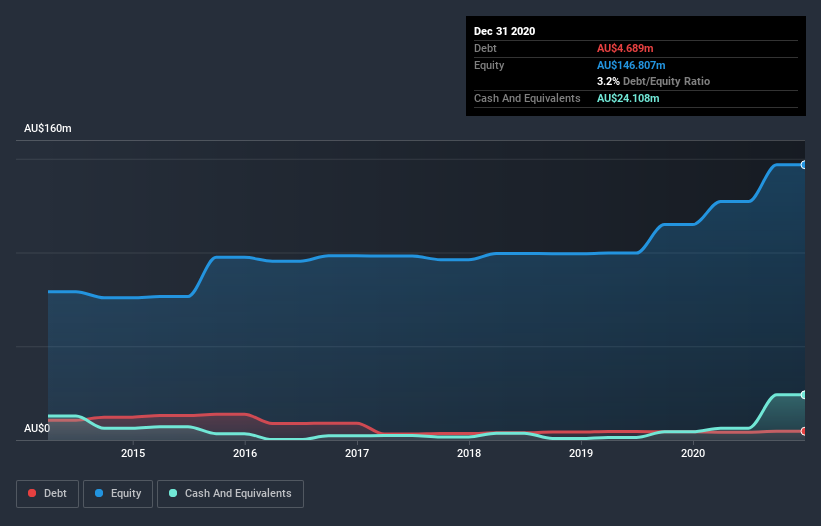
Legendary fund manager Li Lu (who Charlie Munger backed) once said, 'The biggest investment risk is not the volatility of prices, but whether you will suffer a permanent loss of capital.' So it seems the smart money knows that debt - which is usually involved in bankruptcies - is a very important factor, when you assess how risky a company is. We note that Hot Chili Limited (ASX:HCH) does have debt on its balance sheet. But the more important question is: how much risk is that debt creating?
When Is Debt A Problem?
Debt assists a business until the business has trouble paying it off, either with new capital or with free cash flow. Ultimately, if the company can't fulfill its legal obligations to repay debt, shareholders could walk away with nothing. However, a more frequent (but still costly) occurrence is where a company must issue shares at bargain-basement prices, permanently diluting shareholders, just to shore up its balance sheet. Of course, plenty of companies use debt to fund growth, without any negative consequences. When we think about a company's use of debt, we first look at cash and debt together.
Check out our latest analysis for Hot Chili
How Much Debt Does Hot Chili Carry?
The image below, which you can click on for greater detail, shows that at December 2020 Hot Chili had debt of AU$4.69m, up from AU$4.34m in one year. However, it does have AU$24.1m in cash offsetting this, leading to net cash of AU$19.4m.

How Healthy Is Hot Chili's Balance Sheet?
Zooming in on the latest balance sheet data, we can see that Hot Chili had liabilities of AU$8.27m due within 12 months and liabilities of AU$4.69m due beyond that. Offsetting these obligations, it had cash of AU$24.1m as well as receivables valued at AU$7.0k due within 12 months. So it actually has AU$11.2m more liquid assets than total liabilities.
This surplus suggests that Hot Chili has a conservative balance sheet, and could probably eliminate its debt without much difficulty. Simply put, the fact that Hot Chili has more cash than debt is arguably a good indication that it can manage its debt safely. When analysing debt levels, the balance sheet is the obvious place to start. But it is Hot Chili's earnings that will influence how the balance sheet holds up in the future. So when considering debt, it's definitely worth looking at the earnings trend. Click here for an interactive snapshot.
Given its lack of meaningful operating revenue, investors are probably hoping that Hot Chili finds some valuable resources, before it runs out of money.
So How Risky Is Hot Chili?
By their very nature companies that are losing money are more risky than those with a long history of profitability. And in the last year Hot Chili had an earnings before interest and tax (EBIT) loss, truth be told. And over the same period it saw negative free cash outflow of AU$14m and booked a AU$6.3m accounting loss. With only AU$19.4m on the balance sheet, it would appear that its going to need to raise capital again soon. Overall, its balance sheet doesn't seem overly risky, at the moment, but we're always cautious until we see the positive free cash flow. The balance sheet is clearly the area to focus on when you are analysing debt. But ultimately, every company can contain risks that exist outside of the balance sheet. For example, we've discovered 3 warning signs for Hot Chili (2 are potentially serious!) that you should be aware of before investing here.
Of course, if you're the type of investor who prefers buying stocks without the burden of debt, then don't hesitate to discover our exclusive list of net cash growth stocks, today.
If you’re looking to trade Hot Chili, open an account with the lowest-cost* platform trusted by professionals, Interactive Brokers. Their clients from over 200 countries and territories trade stocks, options, futures, forex, bonds and funds worldwide from a single integrated account. Promoted
Valuation is complex, but we're here to simplify it.
Discover if Hot Chili might be undervalued or overvalued with our detailed analysis, featuring fair value estimates, potential risks, dividends, insider trades, and its financial condition.
Access Free AnalysisThis article by Simply Wall St is general in nature. It does not constitute a recommendation to buy or sell any stock, and does not take account of your objectives, or your financial situation. We aim to bring you long-term focused analysis driven by fundamental data. Note that our analysis may not factor in the latest price-sensitive company announcements or qualitative material. Simply Wall St has no position in any stocks mentioned.
*Interactive Brokers Rated Lowest Cost Broker by StockBrokers.com Annual Online Review 2020
Have feedback on this article? Concerned about the content? Get in touch with us directly. Alternatively, email editorial-team (at) simplywallst.com.
About ASX:HCH
Good value with adequate balance sheet.
Similar Companies
Market Insights
Community Narratives




